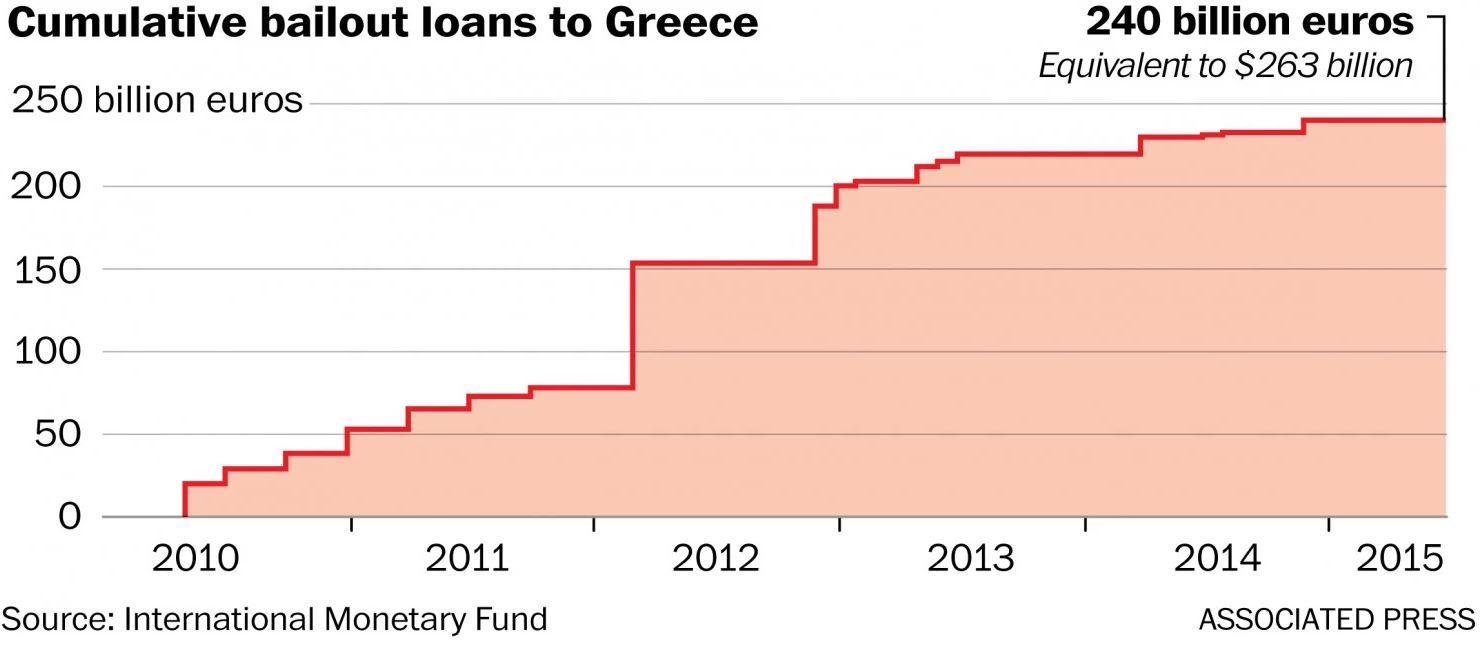The Greek financial crisis is far from over, although the latest developments show how much the establishment players in the bailout want to move on to the-crisis-is-over-so-turn-your-attention-elsewhere mode. While previous bailouts have always been about bailing out the big banks in France and Germany, this one looks different in that it illustrates the limits of German patience with Greece, with collateral requirements for the Greek government and orders to reorganize industries, raise taxes, and cut spending.
No wonder young Greeks are fleeing their country. What caught my attention was a stipulation the Germans removed under pressure from other EU members, especially France, under which a process for Grexit would commence in the event that the Greeks rejected the latest bailout conditions. For the French especially, this was just too much. From WaPo:
On Sunday, French President Francois Hollande also appeared to publicly rebuke Berlin for proposing a clause -- which appeared to have been cut from the draft -- that would temporarily kick Greece out of the euro if it failed to reach a deal with its creditors.
“To deprive ourselves of Greece ... is to deprive ourselves of a country at the very heart of our civilization,” Hollande said on Monday.
Note the assumptions in Hollande’s short statement. Europe is the EU, even though 22 European countries avoid membership (and more avoid its currency). Even whispering the possibility of a Grexit amounts to bringing up the possibility of kicking Greece from Europe itself. To Hollande, this is unfathomable, given Greek’s role at the heart of civilization.
It’s Bruce Yandle’s “Bootleggers and Baptist” theory applied to world governance, with banking interests eager to avoid losses playing the bootlegger role, and faux-proponents of civilization playing that of the Baptists. Individually, neither can provide the political capital for the latest bailout, but by joining forces, they can.

C. Wright Mill’s power elite analysis also applies. Hollande is in power only to the extent that he serves the French crony establishment, including the banks. But to meet its needs, he must make its case in moral terms that would appeal to the median Frog. So never mind if it is harder in the Internet Age to mask wealth transfers from EU taxpayers to this crony (rentier) class. Hollande’s real concern—when he’s not switching paramours and having children out-of-wedlock—is civilization itself.
Western civilization has Greek roots, but we are talking about a Greece today far removed from that of Socrates, Aristotle, and Xenophon. Its post-World War II embrace of socialism has long forced productive members of its society to move elsewhere, to places where, in relative terms, they may keep more of the fruits of their labor and their property is more strongly protected. These are the conditions under which civilization thrives because they promote the specialization and division of labor, economic autonomy, wealth creation, and an interdependence that serves as a condition for peace.
Mises put it this way:
The fundamental facts that brought about cooperation, society, and civilization and transformed the animal man into a human being are the facts that work performed under the division of labor is more productive than isolated work and that man’s reason is capable of recognizing this truth. But for these facts men would have forever remained deadly foes of one another, irreconcilable rivals in their endeavors to secure a portion of the scarce supply of means of sustenance provided by nature.
In contrast, the centralization inherent in the EU, the growth of extra-territorial government bodies and taxing authorities (all requiring new lines of legal violence that didn’t exist previously), the loss of individual and regional sovereignty, and the extension of new classes of public workers dependent on overburdened productive classes—all sow division in society between the favored and the unfavored, and the productive and the unproductive. Such is the un-civilizing future Hollande wishes to maintain by keeping Greece in the EU.
So the stakes are high, and while the median Greek signals confusion by wanting to remain in the EU but unwilling to comply with austerity conditions defined in Brussels, one hopes he might see a better future for his country in default and outside of the EU’s grip. This may seem radical, but the word “radical” is derived from the Latin radicalis, which simply means returning to one’s roots.
As the “heart of our civilization,” Greece has noble roots. Even Hollande knows it. If it’s true, then the radical outcomes are the best ones too.


